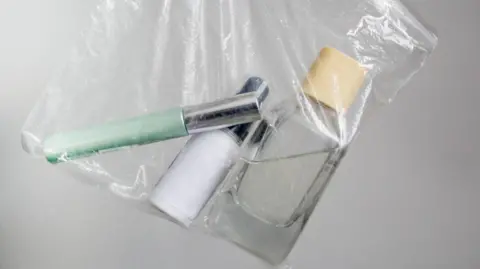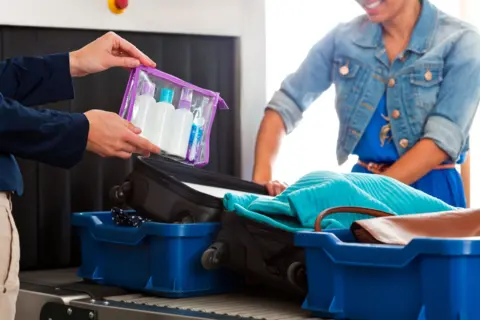 Getty Images
Getty ImagesPassengers travelling through Dublin Airport are being warned about temporary changes to rules around carrying liquids in hand luggage.
The EU has order that from 1 September, all liquids, aerosols and gels must be under 100ml.
This comes after questions were raised over the reliability of new scanners which were to remove the liquids limit.
Dublin Airport operator, Daa, said there were differences in requirements depending on which terminal passengers are flying from.
In Terminal One, all liquids, which must be under 100ml, should be put into a clear one litre bag (20cm x 20cm) and placed visibly in the security tray.
Large electrical items such as laptops and tablets should also be removed from bags and placed in the security tray.
At Terminal Two, where the new scanners have already been installed, all liquids must also be in containers under 100ml and in a clear bag in the security tray.
However, there is no limit on the number of clear bags that a passenger can take through and all electrical items can be left in hand luggage.
 Getty Images
Getty ImagesAt Shannon, Donegal and Kerry Airports, passengers may continue to carry liquids under 100ml without needing to place them in plastic bags or remove them from their hand luggage.
Donegal Airport has had one of the new scanners since October 2020.
At Knock there is no limit on number of plastic bags, but they must be removed from hand luggage.
However, travellers are advised to check the specific requirements of other airports on their route, as these may differ.
Despite the rules being reversed, travel journalist, Eoghan Corry said passengers were unlikely notice the changes.
“Across Europe, only a small number of airports have got the C3 scanners and so the regulations haven’t been lifted by airports” he said.
“Where it really has made a difference is laptops can stay in bags with the new scanners, this slowed down queues just as much as liquids.”
Under the temporary rules, electronics can still remain in bags if you are using a new scanner.
 Getty Images
Getty ImagesThe new scanners use CT X-ray technology to provide 3D images, so items can be left inside bags and liquids up to two litres will be permitted.
However, the EU commission said that due to, “technical information received”, the new scanners would need to revised.
It said it was, “a precautionary measure, in order to maintain the security of air travel”.
Similar changes to this were brought into some UK regional airports in June.
Mr Corry told BBC News NI he believed the problem with the scanners would be solved, “within the next six months or so.”
They are not due to be fully implemented into Dublin or Belfast until October 2025, part of the £100m expansion plan for Belfast International.

